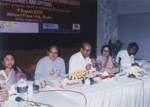Bangladesh: Centralisation in Dhaka blamed for unsustainable development
Published on Wed, 2012-03-14 09:28
The centralization in Dhaka, the capital city of Bangladesh, is responsible for the unsustainable development of that South Asian country, according to the Social Watch Report 2012. The historical absence of long-term planning and overpopulation are the main cause of environmental degradation and resource depletion, said Rezaul Karim Chowdhury, executive director of Coastal Association for Social Transformation (COAST Trust) while launching the study. The report, based on 670 reports of 66 nations, said in its Bangladesh part that centralisation has accentuated geographical imbalance in income in the country. "Dhaka controls 70 per cent of the country's money supply, while attracts 60 per cent of total investment," the report said. Unnayan Shamannay, jointly with the Secretariat of Social Watch secretariat in Bangladesh, organized the launching of the report held at the Dhaka Reporters' Unity on Feb 27. Former advisor to the caretaker government Rasheda K Chowdhury was present as the Chief Guest. In his presentation Rezaul Karim Chowdhury mentioned that, there is historical absence of long-term planning and sustainable development efforts, overpopulation are the main cause of environmental degradation and resource depletion. The report also stated that the city of Dhaka controls about 70% of the country’s money supply and attracts almost 60% of its investment. The report places some specific recommendations for the sustainable development of Bangladesh, such as the creation of a new UN body to take responsibility of climate forced migrants, the obligation of developed countries to provide environmentally friendly technology to LDCs free of cost, and to call on governments to design sustainable planning. Rezaul Karim Chowdhury said, an international court of justice on food rights should be established to pull back the monopoly of market and political manipulation. Rasheda K Chowdhury criticized the developed countries which have almost stopped their assistance with the excuse of the financial crises. "But they are spending hundreds of billions of dollars to bailout different companies and countries. That amount can provide education to all the children in the globe," she added. Among others social rights activist Sanjib Drong and Unnayan Shamannay Project Coordinator Shaheen ul Alam were also present. According to the Social Watch Report 2012, every year nearly half a million people move to Dhaka, and the city has not infrastructure to accommodate its current residents. Almost 45 per cent of Dhaka’s population lives in informal settlements with substandard living conditions. The Social Watch Report 2012 pointed out that natural catastrophe like cyclones, floods, river erosion, losing farmland and absence of viable job market in rural areas have been causing the migration. "This untenable situation is rooted in the historical absence of long-term planning and sustainable development efforts. The governments in the last two decades encouraged centralization, neglected rural development and failed to increase opportunities in other cities than the capital," the report said. While talking on climate change, Rezaul Karim Chowdhury cited the Principle 9 of the Rio Declaration which made clear that the developed countries have the obligation to mitigate the negative impacts of climate change and they can't ignore it. The report has different indicators including basic capability, education, health, empowerment, gender equity, environment, climate change, etc. The Social Watch Report 2012 emphasized specially on climate change which revealed that carbon emission has been increased to 4.6 tonnes per capita from 4.1 tonnes in 2000s globally. The report also showed discrimination in the first world countries. It revealed that even in the first world country like Canada, every one in three indigenous, migrants and disabled people live in poverty while one in every four female (single parent) lives below poverty level there. Sources |


